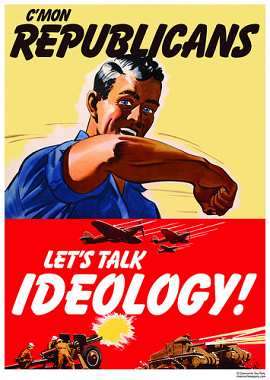Rand Paul: How the West Might Be Won
Despite Donald Trump's march, despite often being heard many discouraging words, Rand Paul continues doing what he set out to do: speaking his message, trying to win hearts and minds and hopefully come next year a lot of votes.

Reports about his current road trip, first from Olivia Nuzzi at Daily Beast. She lays out the grim bill of specifics about falling poll numbers and failing attempts at getting press attention, and, despite the fact that alas we have no solid data about why Rand Paul might be failing to keep his machine against the Washington machine going (we all have our theories) floats the idea that it's because he pivoted too far to the Mitch McConnell GOP center and too far away from the Ron Paul fringe. (That might be true. I'm not sure.)
Then the Rand Paul How the West Might Be Won tour agenda is analyzed:
Paul kicked off the week in Anchorage, which is not usually a high-priority campaign stop for candidates…..
Ron came in third in the Alaska caucuses, but he seemed to energize the libertarian-leaning Republicans in the state. Ron zealot Russ Millette was elected chairman of the Alaska GOP in 2012 (although he was thrown out in 2013)….
After Alaska, Rand traveled to other Ron Paul strongholds. He stopped in Washington State, which Ron Paul won in 2012; Wyoming, where Ron came in third; Idaho, where Ron won the straw poll with over 70 percent of the vote; and Utah, where he came in second.
But whether Rand will be able to convince his dad's supporters of his legitimacy remains to be seen. This time in August 2011, Ron Paul was averaging 9.7 percent in the polls….
David Weigel of the Washington Post is one of the very few reporters still actually following Rand around. He gives a very detailed report framing Paul's newfangled Western strategy, saying Paul is:
barnstorming the West because its Republican voters would cast votes in March 2016. Each of them had a large cache of delegates, and no one else was campaigning for them. In 2012, New Hampshire would send 12 delegates to the next Republican convention. Alaska, where only 14,130 people participated in the caucuses, would send 27 delegates.
Paul talks about how its easier to organize in caucuses, but as Weigel explains at length later in the piece the GOP has changed the rules to make sure that no amount of eagerness on the part of Paul fans at the caucuses or later regional or state level GOP conventions where delegates are chosen will allow his delegate counts to outweigh people who actually just show up at caucuses to cast the ol' beauty contest/straw poll votes.
Depth of support doesn't matter that much anymore in the GOP process. This was done very deliberately to make sure well organized "wrong" candidates like Ron Paul can never win any state at all anywhere ever. It's not good news for Rand Paul.
And these western states are still polling mystery lands, likely very much up for grabs, and can be very important:
Polling has been sparse or nonexistent in the states that will hold mid-March caucuses, despite the fact that they hosted some of 2008's and 2012's biggest upsets. President Obama's campaign flooded Western caucuses to gain a delegate advantage that Hillary Clinton never overcame. Former Pennsylvania senator Rick Santorum won third place or worse first four contests after Iowa. He only became a threat to Mitt Romney after he took the Colorado and Minnesota caucuses.
But without a "caucus strategy" it's just winning hearts and minds one by one. And despite this "Western turn" and the hope to do surprisingly well on the backend in March, that doesn't mean Paul thinks the launching pad states can be ignored:
"You know, my dad didn't lose because of dishonesty," said Paul. "He lost because he didn't get enough votes. Ultimately, you do not have a winning strategy unless you win primaries. It's a great ancillary strategy to win caucuses, but we will work very hard in February to win or place very high in the first four primaries. If you don't score very high, it's hard to go on."
